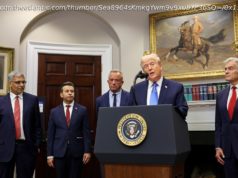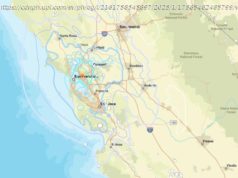Republicans lauded a new Senate investigative report Wednesday that revealed how the Obama administration secretly sought to connect Iran with American banks despite repeatedly assuring…
Republicans lauded a new Senate investigative report Wednesday that revealed how the Obama administration secretly sought to connect Iran with American banks despite repeatedly assuring Congress that Tehran would not be given access to the U. S. financial system under the 2015 nuclear deal.
While former Obama administration officials slammed the GOP-led report as “wildly overblown,” California Republican Rep. Ed Royce praised it as confirming “what we already knew: the Obama administration tried to hide a secret push to give the ayatollah access to the U. S. dollar.”
Mr. Royce ’s comments came after Sen. Rob Portman, Ohio Republican and chairman of the investigations subcommittee that compiled the report, released the document claiming Obama-era State and Treasury Department officials mobilized to give Tehran access to American banks to convert into dollars the windfall of cash it received from sanctions relief under the nuclear deal.
The document accused the former administration of intentionally keeping Congress in the dark when officials subverted remaining U. S. sanctions on Iran in February 2016 to issue a special license for the currency conversion to a major Omani bank and unsuccessfully pressure two U. S. banks to partake in the transaction.
Jarrett Blanc, who served as deputy lead coordinator at the State Department for implementing the 2015 nuclear deal dismissed the accusation Wednesday, asserting in a statement that the report by Republicans on the Senate Homeland Security Committee’s permanent subcommittee on investigations was “wildly overblown.”
“ Iran had money in Oman as a result of transfers made with U. S. support,” said Mr. Blanc, who noted the transfers were part of negotiations that led up to the achievement of the nuclear deal, which saw Iranian assets unfrozen and sanctions lifted in exchange for international inspections of and limits to the Islamic republic’s suspect nuclear program.
Under the final terms of the deal, Iran expected that “these and other assets that had been frozen or highly restricted would be available for licit commercial transitions,” said Mr. Blanc. “Because Iranian commerce with Europe had been most affected by sanctions, Iran had pent up requirements for European purchases and needed to move assets into Euro. This proved unexpectedly difficult in the market, and the U. S. government worked to try to help address the issue.”
Mr. Blanc, now a senior fellow at the Carnegie Endowment for International Peace, went on to argue that administration officials did not hide from Congress that a special license was being given to an Omani bank. “These kinds of licenses are absolutely common in sanctions regimes,” he said. “While specific licenses are not made public, the Administration was transparent with Congress .”
Ned Price, a former CIA official who served as a special assistant to President Obama also lamented the report, tweeting Wednesday that the “GOP is fixated on mischaracterizing a routine Treasury Department action.”
The report coincides shockwaves rippling around the world over President Trump’s May 8 decision to withdraw from the Iran nuclear deal and begin reimposing U. S. sanctions, which the U. S., Europe, China and Russia had collectively lifted in 2015.
Senate investigators told The Washington Times that there was no minority rebuttal to the report, which asserts that “senior U. S. government officials repeatedly testified to Congress that Iranian access to the U. S. financial system was not on the table or part of any [nuclear] deal.”
“Despite these claims, the U. S. Department of the Treasury, at the direction of the U. S. State Department, granted a specific license that authorized a conversion of Iranian assets worth billions of U. S. dollars using the U. S. financial system,” the report said. “Even after the specific license was issued, U. S. government officials maintained in congressional testimony that Iran would not be granted access to the U. S. financial system.”
It also asserted that once the nuclear deal was signed, it remained “illegal for U. S. persons, entities, and financial institutions to do business with Iran or parties on behalf of Iran .”
The ban included any “intermediary” transactions by U. S. banks to convert currency for Iran — a development that would have elevated the value of the Iranian assets on the global market and allowed Tehran to more easily move the money through the international banking system.
On the day the nuclear deal was implemented in 2015, Tehran had some $5.7 billion worth of assets at Bank Muscat in Muscat, Oman, according to Senate investigators, who said Tehran moved quickly to request access to the U. S. dollar. On Tehran ’s request, Bank Muscat contacted the U. S. Treasury Department’s Office of Foreign Assets Control (OFAC).
According to the Senate report: “ Muscat sought to convert $5.7 billion in Omani rials into euros. [But] because the rial is pegged to the U. S. dollar, the most efficient conversion was with an intermediary step through a U. S. bank using U. S. dollars.”
“On February 24,2016, OFAC issued a specific license to Bank Muscat authorizing Iranian assets worth roughly $5.7 billion to flow through the U. S. financial system,” the report said, adding that Treasury officials then directly “encouraged two U. S. correspondent banks to convert the funds.”
The catch, according to Senate investigators, was that neither of the U. S. banks approached by the officials would take on the Iranian currency exchange amid concern over the prospect of being found out to have secretly circumvented the remaining ban on U. S. transactions with the Islamic republic.
Iran was ultimately forced to convert its Bank Muscat assets to euros in small increments using European banks and without accessing the U. S. financial system.
But Mr. Portman said in a statement that “the Obama administration misled the American people and Congress because they were desperate to get a deal with Iran.”
Mr. Royce, who chairs the House Foreign Affairs Committee, echoed the sentiment, asserting that the former administration ’s move was “dangerous” and went “well beyond” the terms agreed to under the nuclear deal with Iran.






